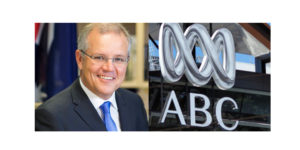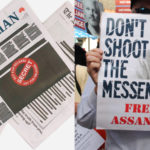RIP Press Freedom: PM Pressures ABC to Change Report About COVID-19 App

Last year, when the Australian Federal Police raided the home of journalist Annika Smethurst over a story she wrote about government plan to spy on ordinary Australians, and, days later, the Sydney offices of the ABC in relation to a story about war crimes in Afghanistan, Prime Minister Scott Morrison was quick to distance himself, and his government from the Police investigation.
The raids sparked international outcry as journalists around the world criticised the Australian Federal government for what appeared to be, press intimidation. The Australian press vowed not to succumb to what appeared to be a very obvious threat to press freedom.
At the time, Prime Minister Scott Morrison was quick to distance himself and his government from any involvement, and also to defend freedom of press.
In a speech to media, he said: “First of all let me say that my government is absolutely committed to freedom of the press, secondly these are matters that were being pursued by the AFP operationally at complete arm’s length from the government, not in the knowledge of the government, not at the instigation of government ministers.”
He went on to say that the investigation had been triggered by referrals from departmental heads before August 2018, when he took the top job, and that no one in his government had any prior knowledge of the raids.
And, on the face of it, these are all the things you’d expect to hear from a Prime Minister who accepts that the media has a vital role to play in democracy, in helping to keep the public informed.
It’s also what you might expect to hear from a leader who believes that media should operate independently of bias, and interference, even when the stories it investigates and the information it uncovers might portray the government in a less than flattering light.
PM’s office interferes in ABC news story
But actions speak louder than words, and there have been reports recently that the PM’s office pressured the ABC to make changes to a story it published about the Covid-19 tracing app.
The PM’s senior media advisor, Nick Creevy, emailed a complaint to ABC News Director, Gavin Morris, regarding the ABC’s story about US tech giant Amazon winning the contract for the COVIDSafe app data storage.
The complaint from the PM’s office criticised the story for its “unnecessarily alarmist” coverage of privacy concerns. The article claimed the data could be “obtainable by US law enforcement”. The ABC later inserted a note in the online story to clarify that “the Covid-19 tracing app will not record people’s movements, only their contact with other people also using the app”, and altered a further bulletin to change “tracking” references to “tracing”.
For many this might seem like ‘minor’ interference. A small alteration of words.
But it can been seen as setting a dangerous precedent. Many, including journalists who fiercely protect their independence, argue that it is perfectly acceptable for factual errors to be corrected, but when a senior government official – or anyone with the power to apply pressure – simply doesn’t like what is being said – a turn of phrase, the tone or writing style or choice of words, and the journalists and publishers acquiesce, then it’s the start of a long, slow and painful death for press freedom, media independence and journalistic integrity.
At the very basis of democracy is freedom of choice, and for people to have freedom of choice, they need information. When that information is tampered with by those in authority, information becomes propaganda.
There have been several concerns over the government’s COVIDSafe app, and in amongst the endless complex technical jargon about how the app actually works, all Australian’s who have been asked to download and use it, have a right to know where their data will be held, how it will be stored, who can access it and for what purpose.
There has also been genuine concern that because Amazon is a US company based in the US, then it must abide by US data laws, which, therefore, could impact Australians whose information it holds.
There have also been legitimate concerns raised by technical experts who say that the app – simply by doing what it’s designed to do, and that is track and trace who’ve we’ve been in contact with, could in fact generate a social contacts map of Ausrralians which has enormous potential value to both Australian law enforcement and foreign governments, as well as global companies.
Media has a right to report information in the public interest
The bottom line is that not just in this instance, but in all stories it seeks to investigate and make public, media should report all information it considers in the public interest.
It’s important to remember that freedoms are often not taken away overnight, but are slowly eroded, sometimes almost imperceptibly, over time, sometimes years, sometimes decades.
How free is the press in Australia?
The Australian Constitution does not explicitly protect free speech or a free press.
However, the High Court has recognised a narrower freedom of political communication that is implied in the Constitution and this relates to communications about government and political matters. IT’s a cornerstone of our democratic process, because it enables voters to exercise a ‘free and informed’ choice at the ballot box.
But in the last several years, many laws have been passed which impact and diminish absolute freedom of the press including recent changes to foreign interference and espionage laws, which now include a secrecy offence that allows anyone who passes on classified information received from a federal public servant – including publishing it – to be jailed for up to five years.
Journalists can seek to rely on a public interest defence in court that they ‘reasonably believed that dispersing the information was in the public interest’ but the reality is that Australia offers fewer protections to journalists than many other Western democracies.
While a Bill of Rights might go some way towards addressing these issues, and give media the confidence to can stand up to any kind of interference or threat to its independence, it is also critical for those who are in positions of authority not to abuse their power by pressuring media when they don’t happen to like the way information is conveyed.







